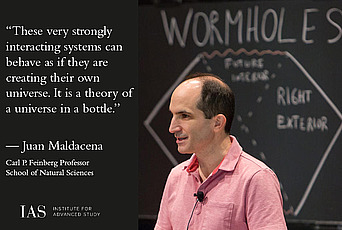Carl P. Feinberg Cross-Disciplinary Program in Innovation Established at IAS

The Carl P. Feinberg Cross-Disciplinary Program in Innovation at the Institute for Advanced Study will unite today’s boldest ideas in physics, mathematics, and beyond to unlock new and fascinating truths about the natural world. Endowed in perpetuity with a gift from Carl P. Feinberg, this supercharged coalition of scholars will expand the Institute’s capacity to advance understanding of the universe and break through to new planes of knowledge. Feinberg is a prolific supporter of physics at IAS. In 2016 he endowed a Professorship of Theoretical Physics, currently held by Juan Maldacena.
“I welcomed the opportunity to make another ‘investment in civilization’ by endowing the Cross-Disciplinary Program in Innovation. I trust the program will complement the Institute’s core mission and extend its impact by providing an agile source of funding with which to rapidly assemble cross-disciplinary teams for brief periods as targeted research opportunities arise,” Feinberg stated.
The most exciting new areas in science are most often created when experts in seemingly distant fields realize that they have chanced upon similar territory, and are drawn by the exigencies of their specialized interest to work together. In fundamental physics, the past decade has seen surprising connections, including those between quantum computation and black holes; new phases of matter, topology, and quantum field theory; and deep new mathematical structures in combinatorics, algebra, and geometry and the basic physics of elementary particle scattering.

“The past few years in particular have seen startling developments—new continents of ideas—largely fueled by the insights of people from very different fields literally collaborating, rather than just lobbing ideas, conjectures, and proofs at each other. This is propelling us to the discovery of new principles deeply connecting spacetime and quantum mechanics,” stated Nima Arkani-Hamed, Professor in the School of Natural Sciences.
Scientific research at the Institute is traditionally driven by the collaboration and independent projects of a full-time Faculty and a revolving class of more than 200 researchers at various stages in their careers. The Carl P. Feinberg Cross-Disciplinary Program in Innovation will build on this successful model with the recruitment of mid-career scholars who have pioneered foundational developments in new areas. Bringing together scholars with such unique insights—which may not be obviously connected to the existing themes of the past 20 or 30 or 40 years—ensures that IAS will remain agile and responsive to new intellectual developments that do not yet fit the mold of what graduate students and postdocs generally know. In order to close this knowledge gap, the program will feature intense, focused workshops and “master classes.”
“Since its founding, the Institute has served as a world center for investigations into the fundamental laws of nature. We are currently in the middle of a grand symbiosis of ideas, from the equations of general relativity to the quantum information of black holes,” stated Robbert Dijkgraaf, IAS Director and Leon Levy Professor. “This revolutionary program will provide a dedicated space and the necessary flexibility to accelerate these exciting developments, and will surely forge new connections across fields.”
This program is an unparalleled opportunity to advance cutting-edge, cross-disciplinary research to unlock deep, new insights into the workings of the natural world.
About the Institute
The Institute for Advanced Study is one of the world’s foremost centers for theoretical research and intellectual inquiry. Located in Princeton, N.J., IAS is dedicated to independent study across the sciences and humanities. Founded in 1930, the Institute is devoted to advancing the frontiers of knowledge without concern for immediate application. From founding IAS Professor Albert Einstein to the foremost thinkers of today, IAS enables bold, curiosity-driven innovation to enrich society in unexpected ways.
Each year, the Institute welcomes more than 200 of the world’s most promising post-doctoral researchers and scholars who are selected and mentored by a permanent Faculty, each of whom are preeminent leaders in their fields. Among present and past Faculty and Members there have been 35 Nobel Laureates, 42 of the 60 Fields Medalists, and 19 of the 22 Abel Prize Laureates, as well as many MacArthur Fellows and Wolf Prize winners.


